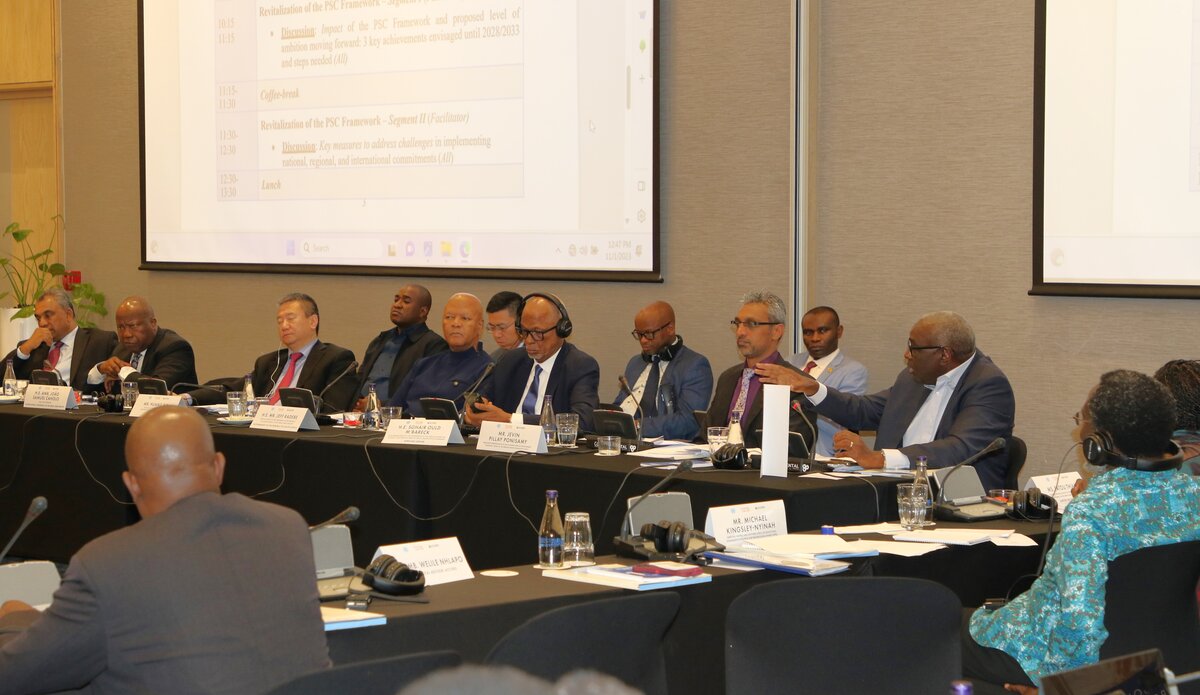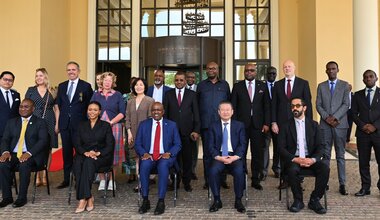The Great Lakes office organizes a retreat to assess the impact of the Peace, Security and Cooperation Framework for the Democratic Republic of the Congo and the region 10 years on
The Office of the Special Envoy for the Great Lakes region in collaboration with the African Union (AU) organized a regional retreat to assess the impact of the Peace, Security and Cooperation (PSC) Framework for the Democratic Republic of the Congo (DRC) and the Great Lakes region. The retreat was facilitated by the African Centre for the Constructive Resolution of Disputes (ACCORD) and took place in Durban, South Africa, from 31 October to 1 November 2023.
The PSC Framework was signed by 11 countries of the region in Addis Ababa, Ethiopia, on 24 February 2013 to bring an end to the recurring cycles of conflict in eastern DRC. On 31 January 2014, two more countries, Kenya, and the Sudan, became signatories of the PSC Framework.
The UN Security Council adopted Resolution 2098 (2013) welcoming the establishment of the PSC Framework and recognizing its potential to bring about a process that would create long-term stability and peace in the Great Lakes region. The PSC Framework outlines national, regional, and international actionable commitments from the signatories, aiming to end violence in eastern DRC and to bring about long-term peace and stability in the region.
Despite ongoing efforts to implement commitments under the PSC Framework, violence in eastern DRC has prevailed coupled by an increase in political tensions between core countries of the region, thereby threatening to reverse hard-won peace gains in the last decade. It is against this backdrop, that the Office of the Special Envoy for the Great Lakes region organized the two-day retreat, in partnership with the South African-based ACCORD, and in close collaboration with the AU. The main objective of the Durban retreat was to initiate an in-depth exchange with key stakeholders to reflect on the implementation impact of the PSC Framework 10 years on and formulate recommendations for its future path.
At the last 11th high-level meeting of the Regional Oversight Mechanism (ROM), held on 6 May 2023 in Bujumbura, Burundi, heads of State and Government of the region requested the Technical Support Committee (TSC) to conduct an “independent, frank and sincere assessment of the implementation of the PSC Framework agreement, highlighting its strengths and weaknesses, and of adherence by the signatory countries to its principles and commitments”.
The retreat was informed by the findings of the assessment and put forward some initial conclusions and recommendations for consideration of the TSC. As a technical branch of the PSC Framework, the TSC comprises senior government representatives of the signatory countries of the PSC Framework, as well as senior officials from the Guarantor institutions, namely the United Nations, African Union, International Conference on the Great Lakes Region (ICGLR), and the Southern African Development Community (SADC). The findings of the assessment report together with the retreat deliberations, will help inform the roadmap for the revitalization of the PSC Framework to be submitted by the TSC at the next high-level meeting of the ROM for endorsement.
The deliberations of the two-day retreat in Durban were informed by the findings and recommendations of this assessment. Together with the conclusions of the retreat, this will help inform the development of a roadmap for the revitalization of the PSC Framework, to be submitted by the TSC at the next high-level meeting of the ROM for endorsement by the heads of State of the region.
The 80 participants at the retreat included representatives of the 13 signatory countries of the PSC Framework, as well as representatives of the Guarantor institutions, current and former senior officials of partner institutions, subject matter experts from the Great Lakes region and beyond, as well as representatives from regional civil society organizations, including women networks and youth forums.
 UN
UN





